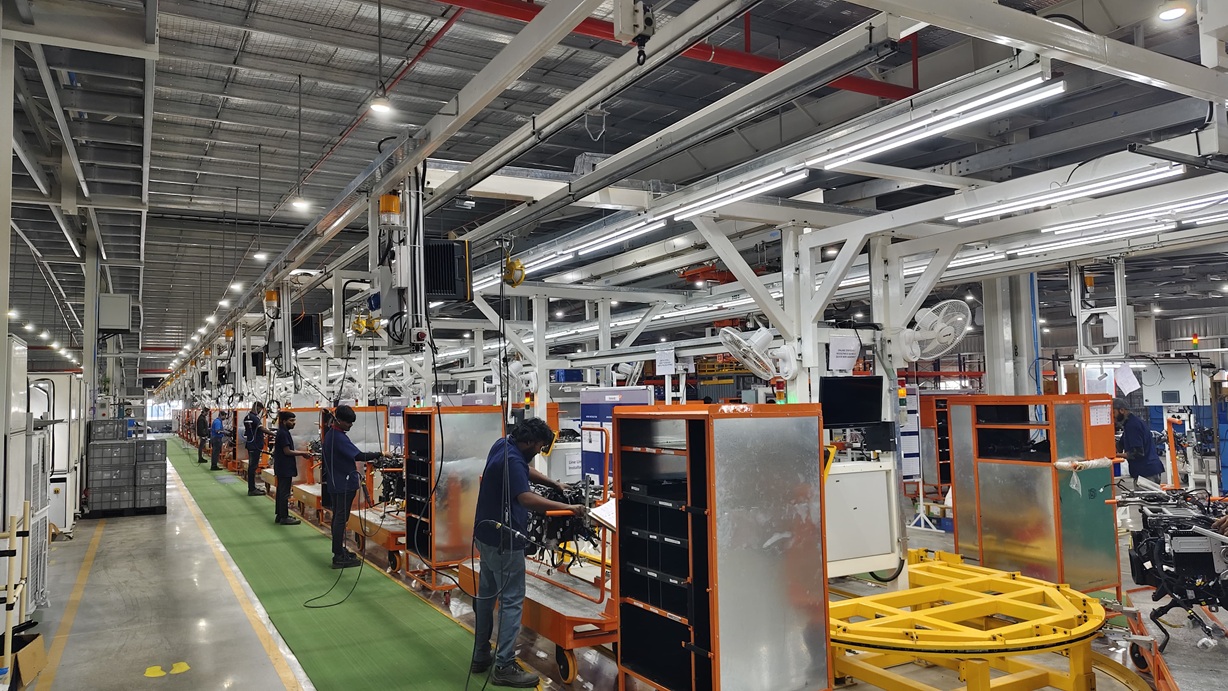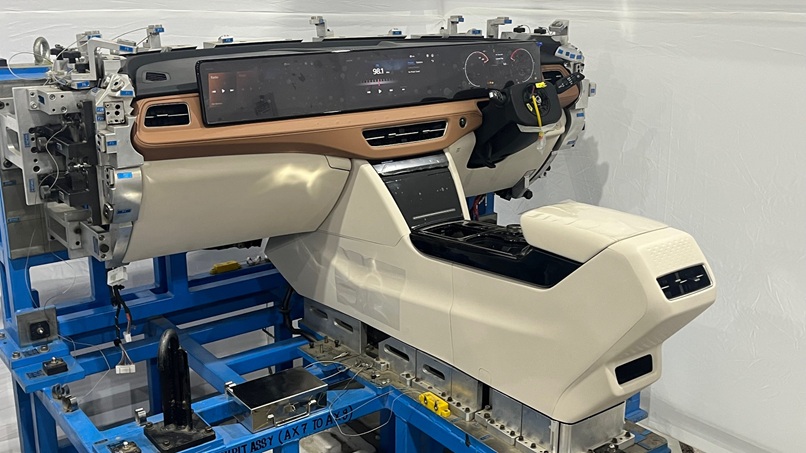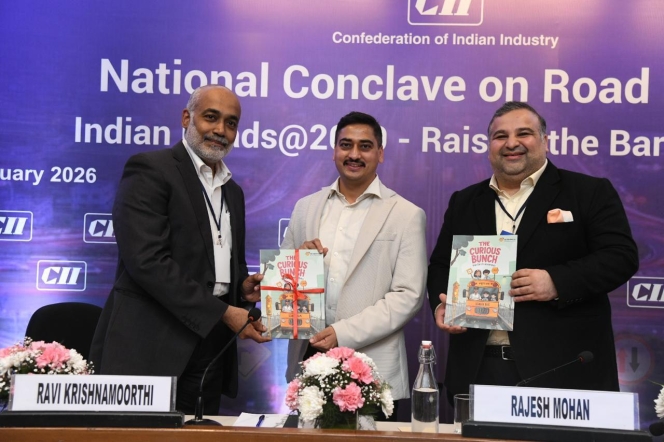Kuka bets on flexible production and logistics solutions
- By Bhushan Mhapralkar
- August 12, 2021

Supporting a smart manufacturing shift across industry sectors by offering robot systems, Automated Guided Vehicles (AGVs), mobility solutions (mobile platforms, mobile robots etc.) and technologies (arc welding, assembly, bonding and sealing, die casting, extrusion etc.), Kuka is confident of its new operating ecosystem iiQKA significantly simplifying robot use. Forming the base of an entire ecosystem that provides access to a powerful selection of components, programmes, apps, services and equipment that are easy to install, operate and use, iiQKA is designed and developed to facilitate newcomers to implement automation without specialised training. Also announcing the upgradation of its simulation software Kuka.Sim.4.0, Kuka is confident of automation benefitting in the medium-term against Covid-19 disruption. As per Peter Mohnen, CEO, Kuka AG, automation can be beneficial in the medium-term against the Covid-19 disruption for manufacturers rethinking their vulnerable, globally networked production and supply chains.
Big shift to flexible automation systems
Stating in his address to the shareholders in the 2020 annual report that the company implemented a cost-cutting drive and focused on a stable financial position, Mohnen averred that Kuka was one of the very few ‘full-range’ suppliers. Keeping a close eye on the developments taking place across the world markets that it is presently in, the company – with sales revenues of EUR 2.6 billion and an employee strength of 14,000 – is confident of its Kuka.Sim.4.0 software to help reach a new level of planning reliability, simplicity and cost efficiency. Stressing on the upgraded software facilitating easy offline programming of the robot and fast cycle time analysis, Kuka is anticipating a big shift to flexible automation solutions with quickly adaptable production cells instead of rigid systems. It is highlighting the prowess of Kuka.Sim.4.0 software in its ability to support the import of CAD data that aids configuration of safety spaces graphically in 3D and to simulate the stopping behaviour of robots.
Affected in 2020 as projects were postponed or abandoned completely, Kuka is of the view that the auto industry is facing a fundamental structural transformation that offers opportunities but poses enormous challenges at the same time. Confident that the Kuka.Sim.4.0 software will particularly aid components suppliers with its ability to facilitate the planning of robot applications across industry sectors, including auto, the company is looking at a growing use of new technologies such as AGVs and AI-based software solutions. Helped by China’s auto industry’s tremendous thrust on robot installation since 2016 in terms of growth, Kuka is banking on the upgraded software’s capability in significantly reducing the area required by a cell. Roland Ritter, Portfolio Manager, Kuka AG, mentioned that it also contains a new robot language called the ‘Kuka Robot Language’ (KRL), which provides two user views for programming the robot. One view is for the experts and the other is for beginners. Ensuring same data is being worked upon by the virtual controller and the real controller, the Kuka.Sim.4.0 supports the new KR Scara and KR Delta robots from its manufacturer. It also assures 100 percent data consistency.
Features, and more features
Aiding the creation of a customised component library using own CAD data along with Kuka.Sim.Modeling add-on, the Kuka.Sim.4.0 software is also supported by a new ‘Connectivity’ add-on that allows users to commission the cell virtually and create a digital twin for greater planning reliability and the best possible implementation. Interestingly, the customised component library could be as kinematic systems, sensors, material flow or physical behaviour. Using behavioural emulators such as WinMOD and SIMIT, the software, with the Arc Welding add-on, aids users to speed up their offline programming for welding applications. The approach positions or the optimum orientation of the robot for the welding process can be defined, for example. A big advantage of the new software, according to Ritter, is export possibilities. Integrators, he adds, will benefit from the ability to export the simulation as a 3D PDF, which can be simply opened with an Acrobat Reader.
Detailed information in 2D for mechanical commissioning can also be provided via the export feature. One of the highlights of this is product presentation using a virtual reality headset. Tablets and smartphones also deliver impressive simulation results on the go via the Mobile Viewer app, informs Ritter. Signing a major contract with Daimler to supply four-figure number of robots and linear units (KR Fortec and KR Quantec), and other Kuka technologies such as software and controllers, the company has maintained a positive outlook despite Covid-19. Working towards strengthening its position as a global player, Kuka is driving the goal of making automation available to everyone. Looking at conquering new areas and new markets, it is stressing on the potential for cobots – sensitive robots – in the auto industry.
- IAC India
- Lumax Group
- IAC Group
- Mahindra
- VECV
- Maruti Suzuki India
- Skoda
- Volkswagen
- Stellantis
- Sunil Koparkar
IAC India Bets On Engineering Depth & Diversification, Targets 20% CAGR Growth Till FY2030
- By Nilesh Wadhwa
- February 28, 2026

Sunil Koparkar, Managing Director, IAC India, outlines the company’s strategy to reduce customer concentration, expand exports and leverage group synergies following its integration with the Lumax Group.
As India’s automotive interior market evolves towards premiumisation, localisation and faster product cycles, IAC India, part of the Lumax Group, is repositioning itself beyond a single-customer dependency model – without diluting its core partnerships.
IAC India continues to derive a significant share of its revenue from Mahindra’s passenger vehicle business. While the concentration remains high, Koparkar is clear that diversification will be driven through growth rather than dilution.
“Mahindra will always be our primary customer. We have a very strong strategic partnership. But we are also working on expanding with other OEMs and in the commercial vehicle space. Our goal remains a 20 percent CAGR,” he says.
For FY2025, IAC India USD 140 million in revenue, and is targeting a 20 percent growth in FY2026. The company counts Mahindra as its primary customer with almost 78 percent of its business coming from them, while Maruti Suzuki India (12%), Volvo Eicher Commercial Vehicles (5%), Skoda-Volkswagen (3%) and Stellantis (1%) contribute towards the remaining business.
 What’s more, responding to the company’s expansion plans, Koparkar revealed, that IAC Group, in addition to introducing new products, is also in talks with new-age players who have just entered Indian market (and also planning too) for supplying products.
What’s more, responding to the company’s expansion plans, Koparkar revealed, that IAC Group, in addition to introducing new products, is also in talks with new-age players who have just entered Indian market (and also planning too) for supplying products.
Currently, passenger vehicles account for roughly 90 percent of the business, with commercial vehicles forming the balance. Value-wise, Koparkar expects CV contribution to rise, even if percentage splits remain broadly similar due to the rapid growth of PV volumes.
Responding to a query on the potential growth from the CV segment, Koparkar said, “There is clear potential in CV interiors. As the CV market moves towards more comfortable cabins — with features like airbags, HVAC and infotainment — the opportunity for interior suppliers increases. Through Volvo Eicher, we have already helped drive that trend in India.”
When asked about the company’s expansion plans, Koparkar also stated that IAC Group is open to expanding to new regions as it aims to operate closer to its customers. One of the potential new projects for the company could very well be Chennai, as the company is in early talks with a new CV customer as well as VinFast.
Engineering as a Standalone Growth Lever
A key pillar of IAC India’s strategy is its expanding engineering capability. The company has been scaling up its R&D and product development team and increasingly positioning engineering services as a distinct revenue stream.
The company at present, employs over 300 engineers in India, which it aims to scale it upto 400-plus by next year and 500-plus in the coming few years.

Historically, the Indian Engineering Centre supported the global IAC Group. “We were primarily the IAC Group engineering development centre. We will continue to provide those services. But now, besides global support, we are also offering engineering services to local OEMs,” Koparkar explains.
These services span studio collaboration, basic product design, CAE analysis and prototype development. In some cases, this can potentially evolve into full-scale supply programmes.
Importantly, innovation is now being formalised locally. “This year alone, we are in the process of filing about 30 patents,” he says. Earlier, intellectual property was subsumed under the global entity; now, filings are being initiated in India.
R&D investment remains aligned with group benchmarks at around 1.5–2 percent of revenue.
Exports: Measured Ambition
In terms of export potential, it currently contributes less than 5 percent towards the revenue, primarily through smaller kinematic parts. Direct exposure to the US market is negligible.
“Tariff-related uncertainty does not affect us because we do not export to the US,” Koparkar says. “Logistically, it does not make sense to ship our large interior parts there.”
Europe remains the primary export target. “The opportunity lies in leveraging our design capabilities and local development strengths. If logistics can be managed efficiently, there is room to grow.”
He also sees the Lumax Group’s aftermarket division as a future vehicle for export expansion.
Localisation and Supply Chain Resilience
On the localisation front, IAC India has made significant progress. “Last year was the first time we were able to localise over 99 percent of our tooling and development in India,” Koparkar states. Machinery on shop floors is largely localised, with only certain raw materials still imported.
The semiconductor crisis, he adds, had minimal direct impact. “We do not source electronics for our products — that is handled by the customer. However, from a development perspective, we are evaluating secondary substitutes for imported components, so we are prepared in case of disruptions.”
Premiumisation, Sustainability and AI
Premiumisation is currently the dominant interior trend. “Customers are moving away from basic plastics to more premium-feel interiors. Electronification is a big driver,” Koparkar says.
Sustainability, however, remains nascent in India. “There is no specific push for sustainable materials yet. What OEMs are looking for is lightweighting to meet upcoming CAFE norms. If a sustainable material delivers significant weight reduction, then it becomes serious.”

He points to jute, coir and bamboo fibres as potential alternatives but stresses that ecosystem-level collaboration is essential. “Unless a circular economy develops around us, sustainable materials will struggle to scale.”
On automation, operations across IAC’s six plants are roughly a 50:50 mix of automated and manual processes, depending on volume justification. Cobots and semi-automation are used where full automation does not offer viable returns.
AI, meanwhile, is expected to influence design more than manufacturing. “We see AI helping us accumulate design learnings and reduce design cycle times. Its impact will be more visible in engineering services than on the shop floor.”
Faster Development Cycles
Product life cycles are shrinking rapidly. “It used to take five years to develop a car,” Koparkar reflects. “With the XUV700, we worked with the customer to shrink that to 42 months. EVs are being developed even faster.”
As development timelines compress and interiors become more technology-intensive, IAC India is betting on engineering depth, localisation strength and group synergies to sustain its 20 percent growth ambition – while steadily broadening its customer and geographic footprint
- Rosmerta Technologies
- The Curious Bunch
- CII National Conclave on Road Safety
- Dr Rajesh Mohan
- Ravi Krishnamoorthi
- road safety
Rosmerta Launches Road Safety Comic Book For Schools
- By MT Bureau
- February 27, 2026

Rosmerta Technologies has launched a comic book titled ‘The Curious Bunch’ at the 3rd Edition of the CII National Conclave on Road Safety. The publication is designed to introduce road safety awareness to children.
The initiative aligns with the Government of India’s ‘4E’ strategy for road safety, which focuses on Engineering, Education, Enforcement and Emergency Care. The comic book aims to address the 168,000 road fatalities reported in India in 2022 by fostering safe habits at a school level.
The comic book uses illustrations to present road scenarios, including pedestrian conduct, school bus safety, traffic signals & the use of helmets, seatbelts and child restraint systems. By educating children, the company intends to influence the behaviour of parents and the wider community.
Rosmerta, a provider of mobility solutions, currently operates technology systems for automated driving tests and AI-based monitoring. The launch of ‘The Curious Bunch’ marks an expansion of its activities into the education pillar of the national safety framework.
Dr Rajesh Mohan, DCP, Gurugram Traffic, said, “When we educate children and instil strong moral and ethical values, the impact travels far beyond the classroom. Children naturally share what they learn. They question, they explain, and they influence conversations at home. In many ways, they become powerful advocates, encouraging their parents to be more aware, more responsible, and more engaged. Over time, this awareness translates into action, because parents are also drivers, commuters, and decision-makers on the road.”
Ravi Krishnamoorthi, Group President, Rosmerta Technologies, said, “Every road accident statistic hides a parent’s anxiety. In 2022 alone, India reported over 168,000 road accident fatalities, according to government data. Road safety is not merely about compliance; it is about compassion and collective responsibility. When a child understands why a red light matters or why a helmet can save a life, they don’t just learn a rule - they become ambassadors of safety within their families and communities. Through ‘The Curious Bunch’, we aim to nurture this awareness early, because the habits we shape in children today will define the safety culture of our nation tomorrow.”
- Maruti Suzuki India
- Transport Department of Tamil Nadu
- Automated Driving Test Tracks
- ADTT
- M K Stalin
- RTO
- CMVR
- Rahul Bharti
Maruti Suzuki Commissions Seven Automated Driving Test Tracks In Tamil Nadu
- By MT Bureau
- February 27, 2026
Maruti Suzuki India, in partnership with the Transport Department of Tamil Nadu, has announced the commissioning of seven Automated Driving Test Tracks (ADTTs) in the state. The facilities were inaugurated by the Chief Minister of Tamil Nadu, M K Stalin.
The tracks are located at Regional Transport Offices (RTOs) in Coimbatore (Central), Tiruvannamalai, Krishnagiri, Madurai (North), Sivagangai, Dindigul, and Tiruchirappalli (West). These sites form part of a Memorandum of Agreement to automate ten tracks across the state, with the remaining three at Tirunelveli, Tuticorin and Marthandam scheduled for operation shortly.
The ADTTs are designed to evaluate applicants for two-wheeler and Light Motor Vehicle (LMV) licences. The system removes human intervention from the evaluation process to ensure objective testing according to the Central Motor Vehicle Rules (CMVR).
Key technical components include:
- Video Analytics: High-definition cameras to monitor vehicle movement and path adherence.
- Sensors: Radio Frequency Identification (RFID) and Harnessing AutoMobiles for Safety (HAMS) technology.
- Identification: Face-recognition systems to verify candidate identity.
- Results: Integrated IT systems that generate test results automatically based on real-time data.
The carmaker has commissioned 56 ADTTs across eight states, including Uttar Pradesh, Delhi, and Bihar. Following the completion of agreements with Rajasthan and Andhra Pradesh, the company’s footprint is expected to reach 81 tracks nationwide.
Rahul Bharti, Senior Executive Officer, Corporate Affairs, Maruti Suzuki India, said, “As part of Maruti Suzuki’s road safety initiatives implemented across multiple states, we are partnering with the Government of Tamil Nadu to strengthen the driver licensing evaluation process through the deployment of 10 Automated Driving Test Tracks (ADTTs). Equipped with high-definition cameras and advanced analytics, these ADTTs enable a comprehensive, efficient, and transparent assessment process. It eliminates any human bias and ensures that only skilled drivers are awarded a license.”
“According to data shared by the Ministry of Road Transport & Highways, India witnessed 1.77 lakh road accident deaths in 2024. Promoting disciplined driving practices and ensuring rigorous driver evaluation are vital to prevent road accidents and augment road safety across the country,” he said.
BYD To sponsor BVRLA Annual Dinner 2026
- By MT Bureau
- February 26, 2026

BYD, the world’s leading manufacturer of New Energy Vehicles, will once again serve as the headline sponsor for the British Vehicle Rental and Leasing Association (BVRLA) Annual Dinner in 2026. This marks the third consecutive year the company has supported the prestigious event, which is set to take place on 4 March 2026 at the JW Marriott Grosvenor House Hotel on Park Lane, London. The dinner is widely recognised as the premier gathering for professionals across the rental, fleet management and leasing sectors.
Through its ongoing sponsorship since 2024, BYD reaffirms its commitment to this vital segment of the UK automotive market. The company’s expanding presence was underscored in 2025 by the introduction of several new models, including the SEALION 7, DOLPHIN SURF, SEAL 6 Saloon and Touring and the ATTO 2. These launches contributed to significant sales figures, with 21,824 units delivered to fleet customers and 5,964 to the rental sector. The momentum has continued into 2026 with the debut of the SEALION 5 DM-i, while the ATTO 2 DM-i and ATTO 3 EVO are expected to arrive shortly. Supporting this growth is a dedicated UK fleet team of 11 specialists, offering tailored product and service expertise.
The BVRLA represents around 1,000 member organisations, ranging from SMEs to large public companies, all operating within or alongside the UK’s vehicle rental and leasing industries. By engaging with government and upholding professional standards, the association enables its members to provide safe, sustainable and accessible transport solutions. This year’s Annual Dinner will feature the presentation of the Industry Hero Awards and live entertainment from award-winning comedian Tom Ward, celebrating excellence across the sector.






Comments (0)
ADD COMMENT